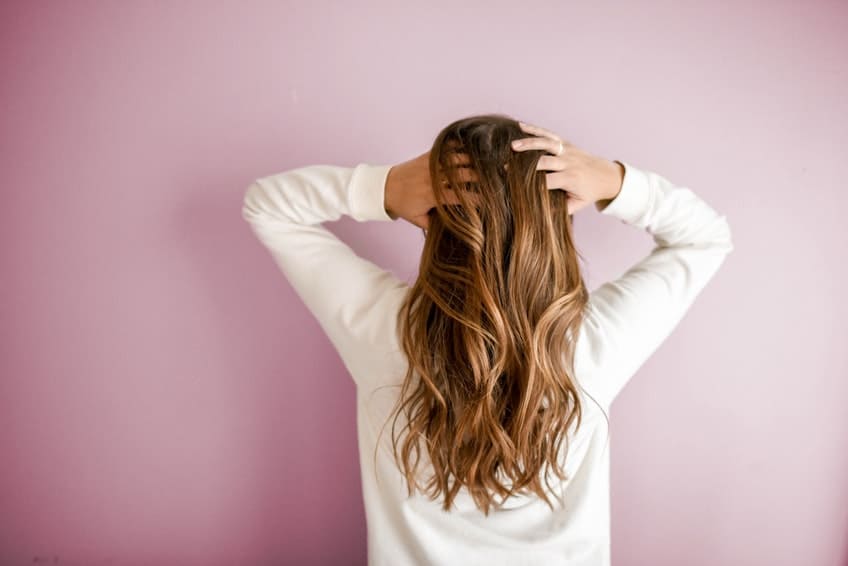Numerous contributions and questions in our Facebook group and in various patient forums show that the topic of hair loss in psoriasis is also often a major concern for those affected by this disease. In this post you will find answers to common questions, measures and effective help for psoriasis-related hair loss.
In more than half of all patients affected by psoriasis, psoriasis is particularly evident on the scalp (technical term: psoriasis capitis) and in the forehead area.
In many cases, psoriasis extends beyond the hairline to the face. The strong formation of dandruff, the intense feeling of tension and the unpleasant itching are often accompanied by (usually) temporary hair loss.
Hair loss – what is it?
When the hair becomes thinner and thinner and increasingly bald spots on the head become visible, this is called hair loss.
Thousands of people in Germany suffer from hair loss. At the same time, for many women and men, hair is a symbol of beauty. Going to the hairdresser or the daily styling of hair are often things that people like to do in order to look particularly good afterwards.
Scalp psoriasis and especially psoriasis in combination with hair loss therefore understandably puts a great deal of strain on those affected.
Causes of hair loss:
- Hormones (especially in women during pregnancy or menopause)
- Stress
- Mental strain
- Predisposition / genes (especially in men)
- Vitamin deficiency
- Heat
- Over styling
- Too many styling products
It is also possible that hair loss is caused by psoriasis itself, or that creams and other medications are the actual cause of hair loss.
Does psoriasis lead to hair loss?
Research shows that more than 50% of all people who suffer from psoriasis also suffer from scalp psoriasis (psoriasis capitis).
Hair loss is not one of the typical symptoms of this disease. However, in the affected areas of the scalp, hair often grows back much scarcer, is more fragile and often separates from the scalp together with the dandruff and thus falls out. So far, however, there have been few scientific studies on this topic, only professional literature which occasionally refers to the topic of hair loss in psoriasis.
Long-lasting and severe forms of psoriasis even damage the hair roots in some cases, so that in the worst cases new hair growth on the head is prevented.
What helps with hair loss and psoriasis?
According to experts, the best treatment and long-term therapy for hair loss is regular scalp care. Ideally, this should be started before the first symptoms of hair loss in connection with psoriasis capitis become apparent on the scalp.
Similar to daily dental hygiene, the scalp should also be cared for as a precautionary measure to maintain the delicate balance of the hair on the head.
However, if you are already suffering from hair loss in combination with psoriasis (generally or with psoriasis capitis), you will find numerous tips and recommendations in this article on how to get hair loss under control again.
First of all, you should talk to your doctor about the symptoms and leave the medical diagnosis and choice of treatment to them. Your doctor will usually be able to tell you whether the hair loss is possibly related to a medication or a cream.
Help with hair loss and psoriasis
In the following, you will find a lot of valuable tips and tricks for the treatment of psoriasis hair loss. Remember, however, that sometimes less is more – so don’t try out all the tips at once, but slowly feel your way through each method, testing over a longer period of time to see if the symptoms improve.
Caffeine helps with hair loss
Caffeine is known to stimulate hair growth. The industry has therefore already developed various shampoos specifically based on caffeine.
These can be easily ordered from Amazon*, for example. When using them, make sure that your scalp does not react negatively to the shampoo.
If you notice any changes, it makes sense not to continue using the shampoo. Alternatively, you can try cold coffee grounds.
As long as there are no side effects, you should test the application of both methods over a longer period of time, just like in therapy.
Carefully remove the dandruff
If you suffer more from a strong keratinization of the scalp in psoriasis, it is also recommended to loosen the dandruff regularly.
You will find a range of shampoos and care products to help you do this, because in some cases, the dandruff also loosens the hair.
Alternatively, you can try a regular oil treatment (e.g. with organic sesame oil or tea tree oil) or a peeling with healing earth*.
Avoid too much care for hair loss
Avoid grooming your hair too much at all costs. A shampoo here, a tincture there and then some oils on your head are definitely too many good things.
Your hair will only be stressed and often cannot cope with this level of care. This kind of over styling often leads to hair loss.
Especially as a person affected by psoriasis, one tries to care for the scalp very intensively. But sometimes less is more.
Natural hair care is better than chemistry
True to the motto: pure nature. Meanwhile there are many products on the market that are produced naturally – free of any harmful substances.
A mild shampoo, a soft hairbrush and a care cure are perfectly suited for this purpose.
Pay attention to vitamin and mineral supply
If the vitamin and mineral balance of your body is not sufficiently covered, this may well be related to your hair loss.
You can control your supply of the most important vitamins and minerals very well through your diet or supplements.
However, you should be aware that supplements are not a substitute for food. Therefore, we recommend that you regulate your supply through your food intake.
Zinc, iron, B vitamins against hair loss
Zinc, iron, B group vitamins and biotin play an important role in this.
You can find these vitamins and minerals in the following foods:
- Porcini mushrooms
- Nuts
- Butter
- Herring
- Cheese
- Sesame
- Pulses
- Oatmeal
Stress reduction also helps against hair loss
Don’t we always hear that? Stress is the trigger for many things and various diseases (for example psoriasis itself). Hair loss can also actually start in the head. Therefore, stress reduction is very important.
Avoiding stress is always easier said than done. Therefore, try to find a specific balance that distracts you from the stresses of everyday life. Whether it is a walk in the country or practicing a certain sport.
You have to find the ideal balance for yourself and you will soon notice that it will do your whole body good.
Nettle tonic against hair loss – A recipe
It couldn’t be more natural. With a self-made tonic made from nettles, you can subject your head to a particularly natural care.
Applied twice a week, it provides your scalp with various minerals and the important provitamin A. Stinging nettle roots, water and wine vinegar – you don’t need any more ingredients for this miracle natural product.
Stinging nettle tonic recipe:
Ingredients:
- 250g stinging nettle roots
- 1 liter of water
- 0.5 liter wine vinegar
Manufacturing:
- for your stinging nettle tonic, put finely chopped stinging nettle roots (fresh or dried) in a pot.
- add water and wine vinegar and simmer for about 30 minutes
- pour through a sieve and collect the resulting brew.
- store the nettle tonic in a well closed bottle for about 4 weeks.
- your tonic is now finished and the treatment on your head can start immediately. Twice a week you can now apply about 5 tablespoons of the tonic directly on the head after washing your hair and massage it in gently – do not rinse out – your scalp will be pleasantly stimulated, and new hair growth can be stimulated at the same time.
Healthy nutrition against hair loss
Through nutrition you can control a lot in your body and actively prevent diseases, such as hair loss (here you can find our nutrition series). Therefore, you should always strive for a balanced and wholesome diet.
Fruit and vegetables should be on the menu as well as healthy organic products. Alcohol and cigarettes should be avoided, and coffee should only be consumed in moderation.
The Coimbra protocol or the autoimmune protocol (AIP) may also be of interest to you.
Styling tips against hair loss
If you are already suffering from hair loss, we have some styling tips for you here:
- Avoid too much heat when styling your hair, like using a straightening iron.
- Make sure that it is not too hot, especially when blow-drying and washing your hair in water.
- You should also avoid brushing your hair roughly or rubbing it hard, all of which irritates your scalp and can lead to hair loss.
- Also pay attention to what styling products you use. There are particularly gentle products on the market today. Your scalp will thank you for it.
Scalp psoriasis
What you can do about scalp psoriasis in general is explained in our article “Psoriasis scalp treatment: what to do about scalp psoriasis”.
There are a number of helpful methods that can help you treat the typical symptoms (itching, dandruff, reddened skin) of scalp psoriasis.
Helpful methods against scalp psoriasis:
- UV rays
- Vitamin D3
- Cortisone creams and fluid
- Creams, shampoos and fluids without cortisone
Conclusion – effective tips for hair loss and psoriasis
As you can see, there are numerous ways to combat and effectively prevent hair loss in combination with psoriasis. You have to find the best method for yourself, which of course requires a lot of patience and time.
However, the methods we have listed are of course no guarantee that your hair loss will stop completely or, even better, that it will not occur in the first place.
Nevertheless, we hope that we have been able to answer some important questions about hair loss in connection with psoriasis.
We wish you every success in the fight against hair loss!
Have you already found your personal miracle cure for hair loss?
Tell us about it in our Facebook group or in the comments – we look forward to welcoming you and your experiences!
Click here to find all references
Sources:
Mrowietz, U.; Schmid-Ott, G. (2012): Psoriasis – What you always wanted to know about psoriasis, Karger Verlag; URL: https://www.karger.com/Article/Abstract/333468. accessed 04-04-2019.
Schmid-Ott, G.; MalewskiI, P.; Kreiselmaier, I.; Mrowietz, U. (2005): Psychosocial consequences of psoriasis-a empirical study on the burden of disease in 3753 affected persons, in: Der Hautarzt – Zeitschrift für Dermatologie, Venerologie und verwandte Gebiete, 5/2005, [issue 56]; URL: https://link.springer.com/article/10.1007/s00105-005-0906-9. Access on: 02.04.2019.
Sticherling, M. (2017): Psoriasis capitis and seborrheic eczema of the scalp, in: Der Hautarzt – Zeitschrift für Dermatologie, Venerologie und verwandte Gebiete, 6/2017, [issue 68]; URL: https://link.springer.com/article/10.1007/s00105-017-3986-4. Access on: 12.04.2019.

Bernd is one of the founders of Simply Psoriasis. He has been suffering from psoriasis for more than 20 years, but sees the chronic skin disease with more composure than a few years ago (which was a hard work). Nevertheless, he is very keen to make psoriasis easier and more socially accepted.









Last Comments